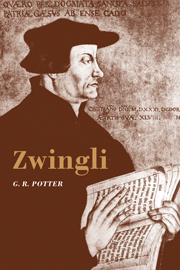Book contents
- Frontmatter
- Contents
- List of maps
- Preface
- Abbreviations used
- map The Swiss Confederation, c. 1515
- 1 Early years
- 2 Parish priest: Glarus and Einsiedeln
- 3 The Zurich ministry
- 4 The first rift
- 5 Road to independence
- 6 From argument to action
- 7 The radical challenge
- 8 Peasants, opposition, education
- 9 Reform and reaction
- 10 Berne intervenes
- 11 Zurich and St Gall
- 12 Zwingli and Luther
- 13 Marburg and after
- 14 Gathering storm
- 15 Precarious peace
- 16 The last year
- Index
15 - Precarious peace
Published online by Cambridge University Press: 13 October 2009
- Frontmatter
- Contents
- List of maps
- Preface
- Abbreviations used
- map The Swiss Confederation, c. 1515
- 1 Early years
- 2 Parish priest: Glarus and Einsiedeln
- 3 The Zurich ministry
- 4 The first rift
- 5 Road to independence
- 6 From argument to action
- 7 The radical challenge
- 8 Peasants, opposition, education
- 9 Reform and reaction
- 10 Berne intervenes
- 11 Zurich and St Gall
- 12 Zwingli and Luther
- 13 Marburg and after
- 14 Gathering storm
- 15 Precarious peace
- 16 The last year
- Index
Summary
Zurich, supported by Berne and their civic allies, was at war with the Inner States for sixteen days (8–24 June 1529), during which there was no fighting but which resulted in a qualified victory for the attackers. The first Land Peace of Kappel (der erste Landfriede), as the agreement which ended the war on 24 June was known, came after over a week of hard bargaining. Its provisions reflected the chief interests involved – the determination of Zurich to extend the evangelical faith and with it to increase its authority in eastern Switzerland, and the anxiety of Berne to keep the confederation in being while at the same time asserting its own authority together with its firm adhesion to a reformed church.
The peace terms were harsh, but were a good deal less severe than Zwingli had wanted. There was not complete submission; the right of each side to maintain its own faith and worship was upheld. The Catholics were not crushed or humiliated; they were not even to be forced to accept evangelical preachers without reciprocity. Instead, the first article called for freedom of belief; no one was to be compelled to adopt a particular faith. In the Mandated Territories the parishes (Gemeinden) were to be free to choose their own form of worship, Catholic or Zwinglian, by a majority vote if necessary, after which there should be no further governmental interference.
- Type
- Chapter
- Information
- Zwingli , pp. 371 - 389Publisher: Cambridge University PressPrint publication year: 1976



